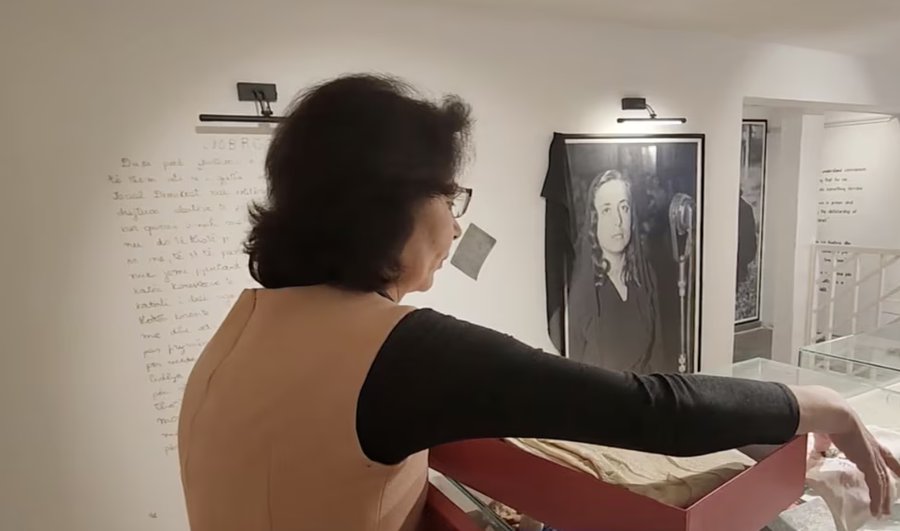
In Gjirokastra, the Memorial Center that was established for Musine Kokalari is expected to exhibit new ethnocultural objects. The objects that Musine herself preserved for years were handed over to her relatives shortly before her death in Rrëshen where she suffered 22 years of internment. The Memorial Center in Gjirokastra welcomes visitors from all over Albania, but also foreigners who seek to get to know the anti-communist dissident of Albania.
In an old house in Gjirokastra that has been turned into a museum, Arieta Kokalari opens a red box containing a dowry from a Gjirokastra girl.
"Musine Kokalari embroidered this dowry herself," says Arieta, although she never wore the bridal veil due to the long imprisonments and persecutions of the communist regime.
"There are two things that particularly struck me about the objects that Musineja left behind. The first is the dowry objects of the daughter of Gjirokastra, during the time of the 'old mother', as she herself defines it. Musineja embroidered them herself, packaged them and put a label on each object with her own handwriting. The second is a wealth of over 100-year-old photos of Gjirokastra that Musineja has preserved and which show the magnificent houses of the city, two-thirds of which are now gone after being demolished."
The bride's dowry is part of an extraordinary ethnocultural treasure that in July 1983 Musine Kokalari handed over to her relatives Platon and Bibika Kokalari in Rrëshen where she was suffering internment, almost a month before her death.
Bibika Kokalari describes that day with excitement.
"I went to Rrëshen with my husband Platon. She had them ready. When Aunt Musineja handed them over to us, she let out a big "Ah", so much so that even to this day, I remember her sigh. She handed them over to us and said: now I can die comfortably."
Musine herself bequeathed that the ethnocultural wealth she collected, including from the prisoners with whom she suffered the punishments of communism, as well as her ethnographic objects, be given to the ethnographic museum in Gjirokastra.
But, since the ethnographic museum is in the birthplace of former Albanian communist dictator Enver Hoxha in Gjirokastra, Bibika refused to allow the objects to be exhibited there.
In an agreement with the city municipality, to which the facilities had been entrusted, the property was recently handed over to Musine's neighbor Arieta.
Arieta aims to exhibit the objects step by step at the "My Museum" Memorial Center, which was established with the support of the Cultural Heritage without Borders organization and the Swedish government.
"All of Musineja's legacy that was given to us by Bibika is unexposed in the Memorial Center that opened last year. We have the opportunity now and our first goal is to build with personal objects her room just as it was in Rrëshen where Musineja lived amidst extreme poverty and the loneliness of communist internment."
Arieta says there are 5 large suitcases with Musine's personal objects, collections of articles and photographs, manuscripts and ethnographic materials.
Among the objects are two black chiffons, one of which Musineja wore at the Tirana Military Court in 1946 as a sign of mourning for her two brothers who were shot without trial by the communists.
"I love my country even though I am not a communist," Musineja declared in court, who would later serve nearly 40 years in prison and internment as a sign of revenge from the regime.
Musineja says Arieta collected articles about the Albanian Renaissance period from the press of the time and kept photos of some of the most famous Albanian Renaissance figures in her room.
"I noticed that she was more interested in the Albanian Renaissance era and Renaissance figures. She collected all the articles that were published about them because, as we know, Musineka considered herself the last of the Renaissance and considered the Renaissance figures her teachers."
February 10th is Musine Kokalari's birthday, although for most of her life her birthdays were spent imprisoned by the communist regime.
Young writer and publicist, the first Albanian politician to establish an opposition party, Musine Kokalari, through her resistance to the communist regime and the rich legacy she has left, seems to be reborn every day for Albanians./ VOA (A2 Televizion)











